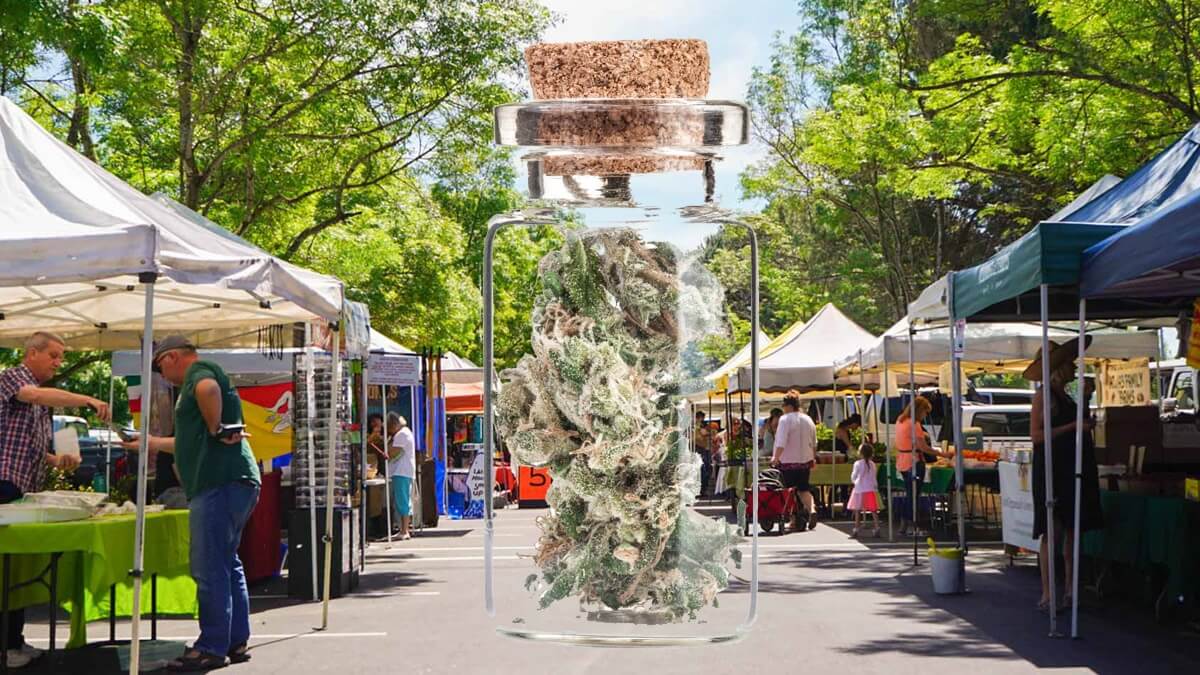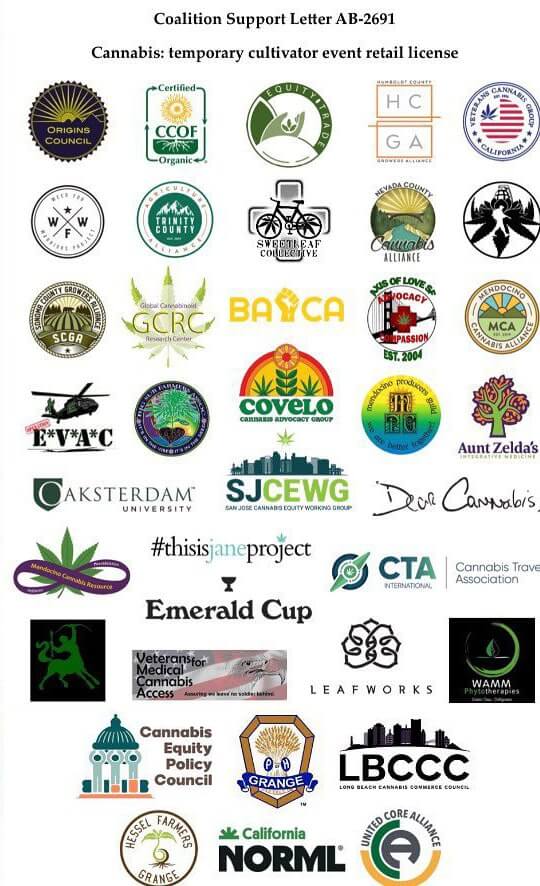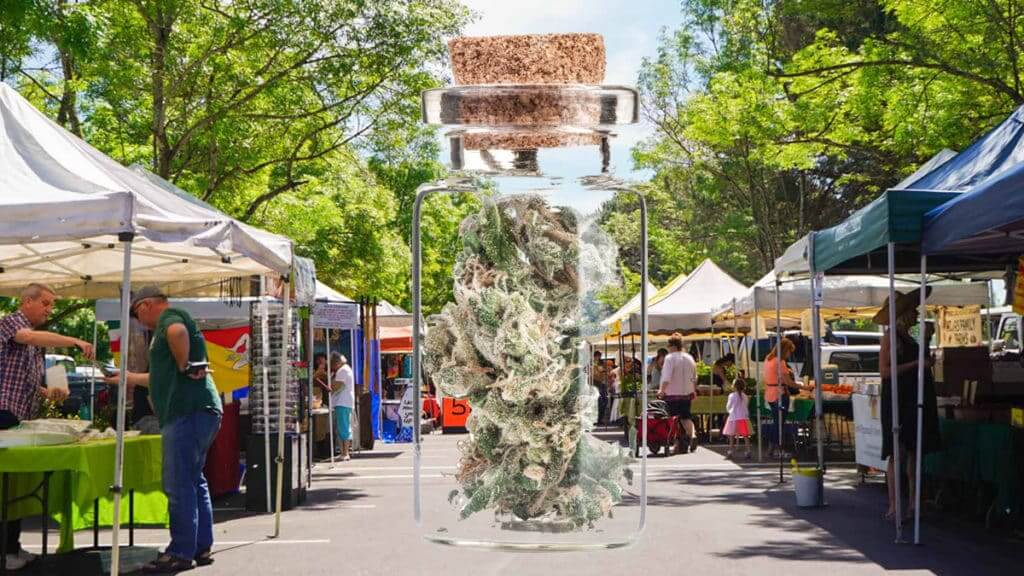
AB 2691 would allow small cannabis growers in California to attend and vend at up to eight farmer’s markets per year. Sounds sweet, right? Not everyone thinks so…
 Whether by design or by sheer ignorance, Prop 64 in California has decimated the ranks of craft cannabis cultivators whose dedication and passion for the plant quite literally sowed the seeds for today’s regulated market.
Whether by design or by sheer ignorance, Prop 64 in California has decimated the ranks of craft cannabis cultivators whose dedication and passion for the plant quite literally sowed the seeds for today’s regulated market.
Those who could afford the incredibly high cost of compliance, licensing, and permitting to get into the so-called legal market were met with nonsensical regulations, unsustainable taxes, a convoluted supply chain, and a value-tanking oversupply of subpar pot.
Clearly, this is a recipe for disaster and ‘disaster’ is a pretty fair description of where Cali’s regulated cannabis market currently stands.
After limping for years, Cali cannabis hit what could almost be considered a stride in 2021, finally raking in $1Billion+ in cannabis tax revenue – the benchmark regulators wrongly predicted would be met in Year 1 of the state’s adult-use recreational market. However, today’s totals are in decline, with Q4 taxable cannabis sales falling 2.8% in the past year, and tax revenue falling by 7.6% in the same timeframe.
There are so many variables that are contributing to the slow death of the regulated market in California, but at the root of those problems is a vast disconnect between the people growing the cannabis and the people expected to buy and consume it all.
Thanks to some grassroots cannabis advocates, however, there is a new bill churning its way through the state legislature right now that, if passed, would help to bridge that gap between cultivators and customers, allowing farmers to include a personal authenticity in their marketing approach and allowing consumers to go directly to the source of the good stuff.
Earlier this month, Assembly Bill 2691 passed the Assembly Appropriations Committee. Next, it will advance to the Assembly Chamber, then the Senate, and then to the desk of Gov. Gavin Newsom to be signed into state law. The most recent vote showed clear support from lawmakers with 12 votes yes, two votes no, along with two who abstained.
Sponsored by Assemblyman Jim Wood (D-CA-002) and Senator Pete McGuire (D-CA-002), AB 2691 would establish a Temporary Event Cultivator License which would allow any California state-licensed grower who is either…
- Cultivating a total of ONE ACRE OR LESS per harvest
- An equity licensee
…to attend up to eight farmer’s markets per calendar year where they would be allowed to sell their own tracked and traced legal weed directly to the public.
It seems like a no-brainer, and something that should have been a foundational plank in Prop 64, yet there are still some folks who are whining to anyone who will listen that this is somehow a bad idea and “subverts the will” of Prop 64 voters.
Right. $75 eighths of straight boof don’t undercut what “the people” want, farmer’s markets do.
Of course, you have the people already running cure-all hemp CBD booths at your local farmer’s market who do not want to see a full-spectrum alternative anywhere near their scam op either. Strange bedfellows.
You have a vast array of jurisdictions that don’t allow any commercial cannabis activity whatsoever, a cancerous side effect of the “local control” aspect of Prop 64. They definitely won’t let this happen either.
 Also, unfortunately, there are more than a few licensed retailers – short-sighted dispensaries and delivery services – who are actively lobbying against this bill, seeing it only as more competition against them.
Also, unfortunately, there are more than a few licensed retailers – short-sighted dispensaries and delivery services – who are actively lobbying against this bill, seeing it only as more competition against them.
The growing list of those in support of AB 2691, however, happens to contain the names of brands and organizations led by some of our biggest heroes in cannabis advocacy. Veterans Walk and Talk, Sweetleaf Collective, Leafworks, Operation EVAC, the Mendocino Cannabis Alliance, the Emerald Cup, and many more have publicly signed on in support of this bill. Spearheading that effort is the Origins Council, a cannabis advocacy conglomerate representing nearly 1,000 small farms across California’s most iconic cannabis communities.
Our friend Colin Wells from Veterans Walk and Talk calls cannabis “The Great Unifier”, and our decades of experience with the plant and its culture have generally proven that to be true. But in a time where every damn thing is so divisive, it seems that even something as sensible as being able to sell legal weed in a booth next to legal tomatoes at a community agricultural market sparks debate.
Will AB 2691 “ruin” Prop 64? Will it subvert the will of the voters who thought they just “legalized” weed in 2016? Will butthurt dispensary owners blacklist small farmers who dare to try to survive a succession of so-called “extinction events”?
AB 2691: CANNABIS… AGRICULTURE, TOMAYTO… TOMAHTO
If all agriculture in the United States was held to the same lab testing standards as California cannabis is, the general population would be a lot healthier but your favorite fruits and veggies would be considerably more expensive.
On the contrary, cannabis is the only crop that requires a government-issued license to grow but is not considered “agriculture” by that same government and is still considered by the federal government to be illegal to grow at all. This Mobius loop of stupidity has rippling effects like rendering cannabis plants and farms ineligible for recognition in the National Organic Program, or ineligible for disaster relief due to droughts or wildfires. It also makes it cost-prohibitive to the point of being a de facto ban to have something like a farm stand or farm tours on the same parcel as the cultivation site itself.
“Being vertically integrated is very much out of reach. These are small, independently owned and operated homestead farms. So, they need the opportunity, on a regional level in particular, to show their wares,” says Genine Coleman, Executive Director of Origins Council. “Wellness tourism is a unique opportunity and the history here is really premised on the fact that this is a medicine, and that biodiversity is key to the medicine, as is the ability for patients to really connect with the source of their medicine.”
Countless non-cannabis farmers across the country qualify for $16 BILLION A YEAR in taxpayer-funded agricultural subsidies to supplement their income, manage the supply of agricultural commodities, and influence the cost and supply of their crops.
Compare that to California crippling legacy farmers with unprecedented compliance costs and tax burdens while the market gets swamped with midgrade product from license-stacking boof-herders who gamed the system and tanked cannabis values in broad daylight.
Don’t get it twisted… just look at booze, food, fashion, or just about any other cultural touchstone and there will always be a sizable market for mids.
That gets to the core of this argument. In a healthy cannabis marketplace, there is room for everything… as long as everything is given room.
Outdoor cannabis farmers get one harvest per year. Many of them, particularly those generational stewards of the plant and of the land, have incredibly compelling stories to tell about their path, their farm, and their flowers. Today’s regulated cannabis market makes it unnecessarily hard for farmers to authentically tell those stories to consumers.
“In the big picture, this bill embodies the broader quest for cannabis to be recognized as agriculture, for farmers to be recognized as farmers, and to employ the effective tools that are out there for different industries to differentiate small-producer markets and craft-specialty markets. That’s who the legacy cannabis farming community is,” says Coleman.
FARMERS MARKET(ING) 101
The first goal of marketing is to convince the target to buy whatever goods or services you’re selling. The real trick, however, is getting them to willingly come back for more.
Budtenders in California dispensaries, especially in SoCal, typically do not have the time or the training to be able to properly explain the many benefits of regeneratively grown outdoor cannabis, or what the custy should expect when they get the jar open.
This leads to a lot of one-and-done customers. That leads to a lot of one-and-done wholesale orders from dispensaries for sungrown cannabis. That leads to an exodus of experienced, passionate, skilled growers from the regulated market. That leads to where we are now with store menus full of mediocre mixed-light Gelato crosses testing at 30% THC and tasting like a cardboard box.
If some dispensary owners think that a farmer attending eight friggin’ farmer’s markets a year will somehow make that downward spiral worse, they’re smoking too much mediocre mixed-light Gelato.
Instead, imagine an afternoon farmer’s market in Mendocino. You take a ride up from the Bay Area for the day and discover the market. With a basket full of fresh, locally-grown produce, you come upon a family, much like your own, a family of farmers who cultivate cannabis right down the road from the tomato farmer you just met. Curious, you buy some weed and take it home.
Rolling a joint and sparking it up, the rush of aromas, flavors, and effects wash over you, leaving you in a state of bliss as you recall the positive and informative interaction you had with the folks who grew the flowers. Over the course of the next week or two, you repeat this process until your jar runs empty.
Do you wait weeks or months and drive hours into the mountains to go see the farmer again? Maybe. More likely, you are looking for more of that awesome sungrown weed, specifically from the farmer you made a connection with, as soon as possible. A quick search online reveals a local dispensary that has just what you’re looking for. You just found the plug, they just got a loyal and educated customer, and the farmer maintains a good working relationship with the store. Everybody wins.
“We have the opportunity to convene direct farmer-to-consumer engagement, education, and marketing in the context of urban places that have retail facilities, and to do that in partnership with retail partners. This is the conversation that we have been having with the BIPOC and social equity retail community to rebuild and reconnect the legacy supply chain of patients, compassion and non-profits, BIPOC and social equity operators in urban jurisdictions, and legacy farmers,” says Coleman, who is optimistic that AB 2691 will eventually be signed into law.
She ended our conversation by saying, “If policy can flow from that place – that this is a human right and it is intrinsic to our own biological functionality – then we will have overcome prohibition.”
AB 2691 will make it easier and more lucrative for licensed craft cannabis farmers in California to sell portions of their harvests directly to the public. BUT you don’t have to wait for the state legislature to get a taste of how dope this experience can be. This weekend, and throughout the summer, in Mendocino you can meet some of the region’s most experienced and talented farmers face to face and even score some weed from them, too!
If you make it to one of these events, tell them the Beard Bros sent you. Then, go home and find these farmers in your local dispensary, tell them Beard Bros sent you there too, and keep supporting small-scale craft cannabis farmers.

















